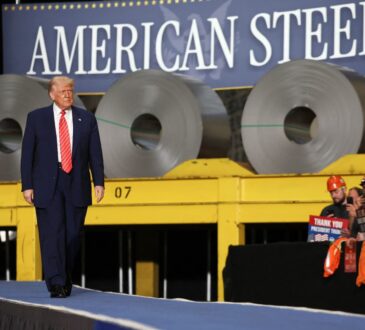Indiana Gov. Mike Braun speaks during rally for property tax reform at Indiana Statehouse
Indiana Gov. Mike Braun speaks during a rally for property tax reform Monday, March 17, 2025, at the Indiana Statehouse.
(Correction: This story was updated to reflect that the 10% property tax credit is off of a homeowner’s bill, not their assessed value.)
The Indiana House on Thursday passed its version of the signature property tax relief bill that has grown to also include reforms of local government finance.
The complex tax proposal in Senate Bill 1, which passed the House 65-29, would mean nearly 67% of Hoosiers pay less in property taxes in 2026 than they will this year, but it wouldn’t have an equal impact on everyone due to changes to income tax calculations, and it could still hurt local governments.
Democrats on Thursday decried the bill as shifting the burden for Hoosiers from property taxes to local income taxes, with House Minority Leader Phil GiaQuinta, D-Fort Wayne, calling the bill “a bait and switch.” At a press conference after the bill passed, House Democrats held red signs printed with white letters that read “No tax hikes for Hoosiers.”
But the negative characterizations of the bill were enough to bring House Speaker Todd Huston down on the House floor to again advocate for Senate Bill 1.
“At the end of the day, what we are doing is we are providing taxpayer relief,” Huston said.
Here are the potential winners, losers and toss ups from SB 1.
Winners
Small businesses
The current version of the bill will likely allow more business owners to be exempt from taxes on business equipment, such as computers or furniture, if they are purchased this year and beyond.
Current law allows businesses to be exempt from equipment taxes if their total assets are valued at less than $80,000. SB 1 has lifted that number to $1 million in 2025 and $2 million in 2026.
“The small mom and pops will be the ones that will qualify for this,” said state Rep. Jeff Thompson, the House’s chief budget writer.
Hoosiers homeowners seeking immediate property tax relief
SB 1 allows homeowners to take a property tax credit worth 10% of the property tax bill on their primary home, up to $300, off of their bills.
The U.S. Census puts the median value of an owner-occupied home in Indiana at just over $200,000. That means Hoosiers who own homes around that midpoint and who have already reached the property tax cap would be able to take that full 10% off their property tax bill next year, saving $200.
Still, this version of the bill only reduces the tax burden for all homeowners by a collective $1.3 million over three years. Gov. Mike Braun’s original property tax proposal would have saved more than three times that.
Hoosiers that only vote in general elections
If you’re a Hoosier voter that only participates in general elections, SB 1 might help you make your voice heard when school districts or local governments ask taxpayers for more money for certain projects.
While SB 1 has seen many changes since the start of the year, the requirement to put referendums and local public questions on general election ballots has been one of the few parts of the bill that has not changed.
Lawmakers have said it’s an effort to get more participation when local governments and school corporations seek more money from their constituents. Sometimes referendums can land at other times of the year, when there might be less participation at the ballot box.
Some senior citizens
More Hoosiers ages 65 and older will be able to take money off their property taxes due to changes in the bill to the eligibility requirements to receive credits.
Under SB 1, tens of thousands of additional seniors can take a maximum of $150 off their property taxes starting in 2026, in addition to the maximum $300 credit for all Hoosier homeowners across the state. The bill no longer puts limitations on access to those credits due to a senior’s total assessed value of their home. It also raises the maximum salary cap for Hoosiers 65 and older to access the credits. A couple with a joint income of up to $70,000 would qualify under this bill. (Under current law, only those with a joint income of $40,000 or less qualify).
Farmers
It’s may not go as far as farmers wanted, but SB 1 changes a portion of how the state calculates the value of farm land, which could reduce assessed values by $280 per acre for the next two years, according to the bill’s fiscal analysis.
Losers
Indiana school districts
Indiana schools may face a challenging future under the new SB 1, between the property tax cuts, the lack of access to local income tax dollars and the addition of the controversial charter school property tax dollar sharing requirements of Senate Bill 518.
In total, schools across Indiana would lose around $744 million in property tax revenues over the next three years under the latest version of the bill. The school district that would lose the most under this plan is South Bend Community Schools, with $27 million lost over the three years.
Out of the top 10 school districts that are at risk of losing the most from the latest version of the bill, eight are either Indianapolis area or local suburban school districts. Hamilton Southeastern Schools would see the second most loss with $26.7 million and Carmel-Clay Schools would see the third most loss at $25.2 million.
No school district in the state would gain any net property tax revenue over the next three years.
Indiana local governments
Indiana’s cities, towns and counties will likely get hundreds of millions of dollars less in revenue over the next three years under SB 1 than they would under existing law, even as cities and towns might be able to turn to local income taxes to help boost revenues.
On a county level, some of Indiana’s most populous counties are expected to miss out on the largest chunk of revenue starting as early as next year, according to a fiscal analysis of the bill. It’s worth noting that their revenues are still largely expected to increase, just not as quickly as they would without this bill in place.
In 2026, Marion County is projected to miss out on more than $43 million. Hamilton County is estimated to miss out on more than $35 million and Lake County nearly $33 million next year.
(Maybe) Renters
There are no tax credits or deductions for renters in SB 1, but renters might have to pay more in local income taxes if the city or town they live in chooses to establish its own local income tax rate to make up for the reduction in property tax collections.
SB 1 allows a city or town with more than 3,500 residents to, for the first time, collect up to 1.2% in local income taxes. That means someone making $50,000 could pay up to an additional $600 per year. It’s unclear at this point what cities and towns across the state might implement their own income tax, but renters would be chipping into those dollars without seeing the same benefits that homeowners receive in the bill.
(Maybe) Hoosiers with high incomes and pricey homes
Hoosiers with high-value homes that likely see property tax bills of $3,000 or more still would only be able to claim a $300 tax credit. That means if someone lives in a city whose leaders decides to implement a local income tax, the added costs could outweigh the savings of the property tax relief. Again, it’s unclear how many city leaders will take on the political risks associated with passing a tax increase.
Disabled veterans
While SB 1 provides disabled veterans with an additional $250 property tax credit that can be added on top of the credits for all Hoosier homeowners, the bill would expire significant deductions that disabled veterans currently have access to in state law. While House Republicans this week said more veterans might have access to the credit, some veterans are concerned about the historic deductions going away.
Currently, disabled veterans can take a $24,960 deduction off their assessed value if they meet certain eligibility requirements. Disabled veterans could also take another $14,000 off their tax liability if their home is valued under $200,000.
Neutral
First time homebuyers
There are no tax credits specifically set aside for first time homebuyers, in this version of the property tax relief bill. The version that passed the Senate in February did include a credit for first-time home buyers, but that was scrapped in House amendments this week.
House Republicans also defeated a Democratic amendment that would have brought that proposal back into SB 1 and split funding for the credit between local governments and the state.
Businesses with big machinery
For maybe 48 hours this week, businesses with massive equipment costs seemed like they might come out on top in the version of SB 1 that was approved by a House committee on Monday.
That version of the bill included a phase out and eventual elimination of the state’s business equipment tax, which was a deep concern for local governments that saw it as another difficult hit to their coffers. But the bill was amended on Wednesday to remove the future elimination of the business equipment tax.
What’s next for the proposal?
The bill will now return to the Senate for a final vote before it can go to Braun for consideration. With the bill author already signaling he’s on board with the House’s changes, the proposal could become law within a week.
Contact IndyStar state government and politics reporter Brittany Carloni at brittany.carloni@indystar.com. Follow her on Twitter/X @CarloniBrittany.
Sign up for our free weekly politics newsletter, Checks & Balances, curated by IndyStar political and government reporters.




